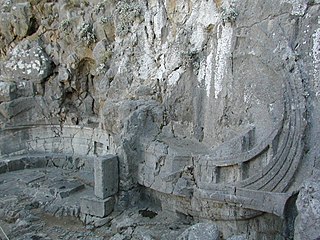 W
WThe Seleucid War, also known as the War of Antiochos or the Syrian War, was a military conflict between two coalitions led by the Roman Republic and the Seleucid Empire. The fighting took place in modern day southern Greece, the Aegean Sea and Asia Minor.
 W
WThe Battle of Thermopylae took place on 24 April 191 BC. It was fought as part of the Roman–Seleucid War, pitting forces of the Roman Republic led by the consul Manius Acilius Glabrio against a Seleucid-Aetolian army of Antiochus III the Great.
 W
WThe Battle of Corycus, also known as the Battle of Kissos took place in September 191 BC. It was fought as part of the Roman–Seleucid War, pitting the fleets of the Roman Republic led by Admiral Gaius Livius Salinator and its Pergamene allies under Eumenes II against a Seleucid fleet of Polyxenidas.
 W
WThe Battle of the Eurymedon, also known as the Battle of Side took place in August 190 BC. It was fought as part of the Roman–Seleucid War, pitting the fleets of Rhodes under admiral Eudamus against a Seleucid fleet of Hannibal.
 W
WThe Battle of Magnesia took place in either December 190 or January 189 BC. It was fought as part of the Roman–Seleucid War, pitting forces of the Roman Republic led by the consul Lucius Cornelius Scipio Asiaticus and the allied Kingdom of Pergamon under Eumenes II against a Seleucid army of Antiochus III the Great. The two armies initially camped north-east of Magnesia ad Sipylum in Asia Minor, attempting to provoke each other into a battle on favorable terrain for several days.
 W
WThe Battle of Myonessus took place in September 190 BC. It was fought as part of the Roman–Seleucid War, pitting the fleets of the Roman Republic led by Admiral Lucius Aemilius Regillus and its Rhodian allies under Eudamus against a Seleucid fleet of Polyxenidas.
 W
WThe Treaty of Apamea was a peace treaty on 188 BC between the Roman Republic and Antiochus III, ruler of the Seleucid Empire. It took place after the Romans' victories in the Battle of Thermopylae, in the Battle of Magnesia and after Roman and Rhodian naval victories over the Seleucid navy.